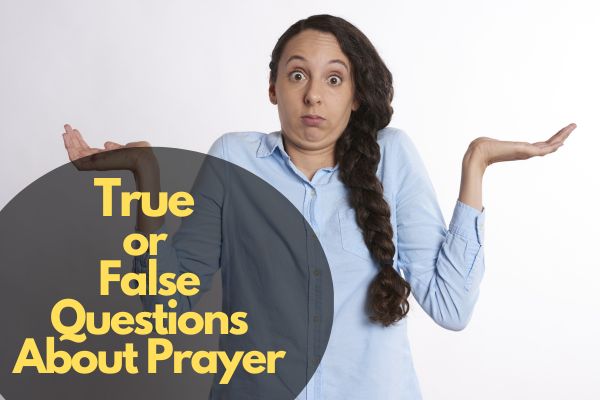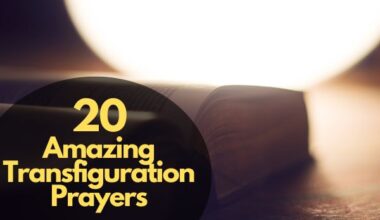Table of Contents Show
Prayer is a profound and ancient practice that has been a part of human history for centuries. It’s a universal act that transcends boundaries and has a significant impact on people’s lives.
In this article, we look into True or False Questions About Prayer to uncover the mysteries, myths, and truths surrounding this deeply spiritual activity.
What Is Prayer?
Prayer is a form of communication with a higher power, be it a deity, the universe, or one’s inner self. It serves as a means of expressing gratitude, seeking guidance, and finding solace in times of need. Prayer can bring about positive change in one’s life. It can promote inner peace, reduce stress, and create a sense of connection with something greater than oneself.
True or False Questions About Prayer
Let’s separate fact from fiction with these true or false questions about prayer:
Prayer Can Change the Past
False. Prayer has the power to influence the future but cannot alter events that have already occurred.
All Prayers Are Answered
False. Not all prayers are answered in the way we expect. Sometimes, the answer is a ‘no’ or ‘not now.’
Prayer Requires a Specific Location
False. While some prefer to pray in specific places, prayer can be done anywhere, as it is a personal connection.
Prayer Is Exclusive to Religion
False. Prayer is not limited to any specific religion and is a universal practice.
Prayer Is a Monologue
False. Prayer is often seen as a dialogue with a higher power, where listening is as important as speaking.
Prayer Can Heal Physical Ailments
True. Many people believe in the healing power of prayer and its positive impact on health.
Does Prayer Always Work?
Prayer is a personal experience, and its effectiveness can vary from person to person. While it may not always produce immediate results, many find comfort in the act of praying itself.
Prayer Can Only Be Verbal
False. Prayer can be expressed verbally, but it can also be silent, written, or even expressed through actions and intentions.
You Need to Pray Every Day
False. While a daily prayer practice can be beneficial, there are no strict rules. You can pray as often as it feels right for you.
Prayer Is Only for Asking for Favors
False. While many prayers involve requests, prayer is also a way to express gratitude, seek guidance, or simply connect with a higher power.
You Have to Follow a Specific Script
False. There are no set scripts for prayer. You can pray in your own words and from the heart.
Prayer Guarantees a Positive Outcome
False. While prayer can have positive effects, there are no guarantees. Outcomes may not always align with our desires.
Prayer Is a Religious Obligation
False. Prayer can be a personal choice and is not always an obligation within a religious context.
Prayer Is Always Done Alone
False. While individual prayer is common, group prayers and community gatherings are also prevalent.
You Must Be in a Certain State of Mind to Pray
False. Prayer can be done in any emotional state. It can provide solace and clarity during difficult times.
Prayer Is About Following Rituals
False. While rituals can be a part of prayer for some, it’s not a requirement. Personalization is encouraged.
Prayer Is Only About Asking for Help
False. Prayer can be a means of self-reflection, self-improvement, and expressing emotions beyond seeking help.
Prayer Is About Religion
False. Prayer can be a spiritual practice that transcends religious boundaries, and it can be a deeply personal experience.
Prayer Always Requires Faith
False. While faith can enhance the prayer experience, even those with doubts or questions can pray.
Conclusion
True or False Questions About Prayer have allowed us to explore the multifaceted nature of this spiritual practice. While prayer may not have the power to change the past, it holds immense potential to shape our future, promote healing, and provide solace. It’s a deeply personal and universal journey that transcends boundaries and beliefs.
FAQs About Prayer
Let’s address some common questions about prayer:
How Do I Start Praying?
Praying is a personal journey. Find a quiet space, focus your thoughts, and express your intentions sincerely.
Can I Pray for Material Wealth?
Yes, you can, but it’s essential to remember that material gain is not the primary purpose of prayer.
Is There a Right Way to Pray?
There is no ‘right’ way to pray. Follow your heart and intuition to create a prayer practice that feels authentic to you.
Do I Have to Believe in a Higher Power to Pray?
Belief in a higher power is not a prerequisite for prayer. It can also be a form of self-reflection and meditation.
Can Prayer Help in Times of Grief?
Yes, prayer can provide solace and emotional support during times of grief.








